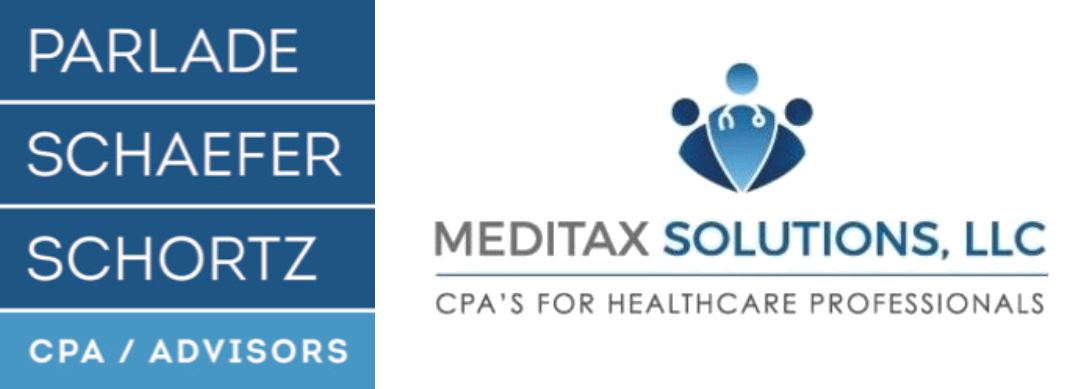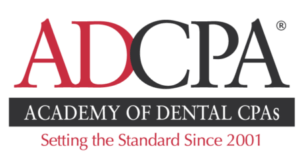Parlade Schaefer Schortz CPAs Blog

22 Apr, 2024
In the demands of your profession, it's easy to overlook planning for your future and the legacy you'll leave behind. Estate planning may not be the most exhilarating topic, but it's essential to securing your assets, providing for your loved ones, and reducing their burdens. 8 Estate Planning Steps for Healthcare Professionals to Provide for Your Loved Ones 1. Begin with the End in Mind Imagine yourself in the distant future, looking back at your achievements. What legacy do you want to leave behind? What impact do you want to have on your family, community, and profession? Starting with a clear vision of your legacy can help guide your estate planning decisions and ensure they align with your values and goals. 2. Take Inventory of Your Assets Estate planning begins with understanding what you own and how you want those assets to be distributed. Consider your valuable possessions beyond financial accounts and real estate, such as family heirlooms, art collections, and intellectual property rights. Don't forget to account for digital assets like online accounts and cryptocurrency, which require special consideration in your estate plan. 3. Protect Your Loved Ones with a Will A will is the foundation of an estate plan. A will provides instructions on how to distribute your assets after passing and can serve to appoint guardians for minor children if necessary. But estate planning isn't just about what happens after you're gone – it's also about protecting your loved ones while alive. Consider drafting a Living Will and Healthcare Power of Attorney to outline your medical preferences and appoint someone to act on your behalf if you become unable to do so. 4. Minimize Taxes and Probate Hassles Nobody likes paying taxes, especially after they're gone. Fortunately, estate planning offers various strategies to minimize estate taxes and avoid the hassles of probate. Explore options like trusts, gifting strategies, and beneficiary designations to transfer assets efficiently and avoid unnecessary tax burdens and legal complications. 5. Consider Establishing a Living Trust While a last will is essential for outlining your wishes, it's important to note that a will doesn't prevent probate. To avoid probate and ensure a smoother transfer of assets to your beneficiaries, consider establishing a Living Trust as part of your estate plan. With a Living Trust, you can place your assets in a trust, with directives on distributing the assets after your passing. Transferring your assets to a living trust can bypass probate and allow direct distribution of them according to your terms, saving time and money for your loved ones. A Living Trust also provides more privacy for your estate because it doesn't become a public record in probate court. 6. Plan for Long-Term Care and Disability As a healthcare professional, you understand the importance of planning for the unexpected. Long-term care and disability can significantly impact your finances and quality of life in retirement. Consider incorporating insurance policies, such as long-term care insurance and disability income insurance, into your estate plan to provide financial protection and peace of mind for you and your family. 7. Communicate Your Wishes Effective estate planning isn't just about legal documents – it's also about communication. Involving your family in estate planning can foster understanding, unity, and peace of mind for everyone involved. Share your wishes, explain your decisions, and address any concerns or questions they may have. 8. Review and Update Regularly Life is constantly changing, and so should your estate plan. Marriage, divorce, birth, death, career changes, and financial fluctuations can all impact your estate planning needs. Make it a habit review and keep your estate plan up to date. Healthcare Professional Estate Planning When we go, we want to know that our loved ones are cared for and that all we have worked hard to achieve is still of benefit to others. Estate planning is essential to a financial plan with your loved ones in mind. We are financial planners and CPAs in Florida specializing in serving doctors, dentists, and healthcare providers in financial and tax services for individuals and businesses. We are located in Punta Gorda and South Miami, Florida. If you have any questions, please give us a call .

06 Mar, 2024
Student debt, especially for medical doctors and dentists, is ridiculously high. The average debt is between $200,000 and $293,000, a sizeable stressful burden. Here is a list of 10 tips to help reduce student debt faster. 1. Income-Driven Repayment Plans (IDR) IDRs calculate your monthly payment based on your income rather than the total debt, which can be particularly beneficial during residency. This approach makes repayments more manageable and may qualify you for federal programs that cover part or all of the interest accruing on your loans. 2. Refinancing Securing a lower interest rate through refinancing is a prime strategy for alleviating the weight of student loans. For example, refinancing companies like SoFi offer reduced rates, potentially cutting the interest from 7% to as low as 2.25%, alongside perks such as debt forgiveness in specific scenarios, making significant savings on interest payments a reality. 3. Military Service Repayment Programs Committing to military service can expedite debt reduction through substantial loan repayment programs and stipends, with offerings like up to $120,000 in loan repayment for active duty members and sizable sign-on bonuses for specific specialties. 4. Federal Loan Forgiveness Programs The Public Service Loan Forgiveness (PSLF) offers a route to cancel the remaining debt after ten years of service in high-need areas or non-profit sectors. Other federal initiatives include the Indian Health Services and National Institutes of Health Loan Repayment Programs, which provide substantial financial assistance in return for service commitments. 5. State Loan Repayment Assistance Many states have programs to attract health professionals to serve in areas with significant healthcare shortages, offering loan repayment as an incentive. Research through resources like the National Health Service Corps and the AAMC can uncover these opportunities. 6. Tax Deductions Taking advantage of tax deductions for student loan interest and tuition can yield savings, reducing taxable income and stretching your dollars further. 7. Biweekly Payments Splitting your monthly payment into biweekly contributions can reduce your interest over the life of the loan and shorten the repayment period, as you'll make one extra full payment each year. 8. Loan Forgiveness for Volunteers Organizations like AmeriCorps, Peace Corps, and certain volunteer programs offer loan forgiveness or repayment assistance in exchange for service, presenting a dual opportunity to contribute to social causes while easing debt burdens. 9. Employer Repayment Programs Some employers offer student loan repayment as part of their benefits package. Investigate whether your workplace or potential employers provide such incentives, which can directly reduce your loan balance. 10. Automate Payments Many loan servicers offer a reduced interest rate for setting up automatic payments. This ensures you never miss a payment and lowers the total interest paid over time. By embracing these strategies, from seeking better interest rates and leveraging loan forgiveness programs to taking advantage of tax deductions and employer benefits, you can navigate a faster route to clearing dental or medical school debt. While the journey may require sacrifices and strategic planning, the freedom from debt is well worth the effort. We at PSSCPAs are financial advisors in Florida specializing in helping medical professionals reach their financial dreams, don’t hesitate to contact us.
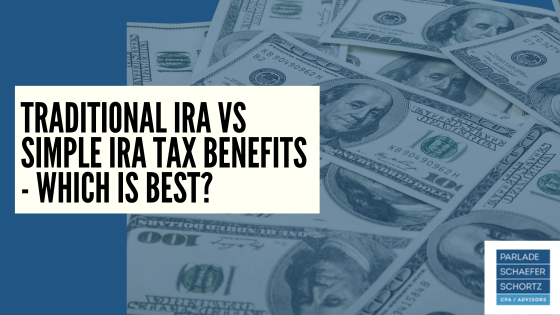
07 Feb, 2024
Comparing the tax benefits of a Traditional IRA (Individual Retirement Account) and a SIMPLE IRA (Savings Incentive Match Plan for Employees) can be crucial in making informed decisions about retirement planning. Here's a breakdown of the tax benefits of each: Traditional IRA Tax Benefits 1. Tax Deductibility: Your contributions to a traditional IRA are typically deductible on your yearly income tax. This reduces your annual taxable income, potentially lowering your overall tax bill. 2. Tax-Deferred Growth: Investments within a Traditional IRA grow tax-deferred, which means you only pay taxes on the gains once you begin withdrawing money from the account during retirement. 3. Income Limits: You lose the contribution tax deduction if you exceed the income threshold and have a work retirement plan. However, there are no income limits on having a Traditional IRA. 4. Early Withdrawal Penalties: If you withdraw funds from a Traditional IRA before age 59 ½, you likely will be penalized a 10% early withdrawal fee, though there are some exceptions. SIMPLE IRA Tax Benefits SIMPLE IRA Tax Benefits 1. Tax Deferral: Contributions to a SIMPLE IRA are pre-tax, having a greater impact on reducing your taxable income. 2. Employer Contributions: Employers must contribute to a SIMPLE IRA plan, either through matching or non-elective contributions. These contributions are tax-deductible for the employer and grow tax-deferred until withdrawn. 3. Employee Contributions Employees can contribute to a SIMPLE IRA through salary deferral contributions, which are also tax-deductible. 4. Early Withdrawal Penalties: Similar to Traditional IRAs, SIMPLE IRAs are penalized 10% for early withdrawal before 59 1/2, with a few exceptions. Traditional IRA vs SIMPLE IRA Tax Benefits Traditional and SIMPLE IRAs offer tax-deferred growth, so you don't pay taxes until you choose to cash out. Traditional IRAs may offer more flexibility in investment choices than SIMPLE IRAs, typically offered through an employer. SIMPLE IRAs require employer contributions, which can be advantageous for employees. Both accounts have penalties for early withdrawal before age 59 ½. The choice between a Traditional and SIMPLE IRA often depends on factors such as employment situation, income level, and individual retirement goals. If you have questions, we are tax professionals and financial consultants in Florida, helping our clients plan and achieve their financial goals. We are here for you and can help you choose the best option for planning your retirement. You can talk to us here to get help with navigating your financial journey.

08 Jan, 2024
Does Florida Have an Inheritance Tax? Florida is renowned for its sunshine, beautiful beaches, and favorable tax climate. One key aspect that separates the state is its lack of an inheritance tax. Unlike some other states in the U.S., Florida does not impose an inheritance tax or estate tax. Benefits of Florida’s No Inheritance Tax: 1. Attractive for Retirees: Florida is an optimal state for retirees because of its beautiful weather and favorable tax climate. The absence of an inheritance tax adds to its appeal, allowing retirees to pass on their wealth to their heirs without additional taxes. 2. Stimulates Economic Growth: The absence of an inheritance tax encourages wealthy individuals to reside in or relocate to Florida, leading to increased economic activity. 3. Retained Family Wealth: Families in Florida can retain a larger portion of their wealth, as state-level inheritance taxes do not erode it. This allows for the preservation and growth of family assets over generations. While the benefits of not being taxed, really don't need an explanation, there are other taxes that may be imposed upon inherited property. While Florida does not have an inheritance tax or estate tax, federal tax implications could be associated with liquidating inherited assets, depending on the nature and value of those assets. Here are some considerations: Federal Estate Tax: The federal government imposes an estate tax on the transfer of assets upon an individual's death. However, this tax generally applies only to vast estates. As of 2022, the federal estate tax exemption is relatively high, and therefore inheritance taxation isn't a concern for most. However, note tax laws can change at any time. Capital Gains Tax: Capital gains tax may apply when inherited assets, like property and stocks are liquidated. The basis of the assets is typically "stepped up" to their fair market value at the time of the decedent's death, which can reduce the capital gains tax liability. However, any appreciation in value after the inheritance may still be subject to capital gains tax. Income Tax on Retirement Accounts: If the inherited assets include retirement accounts, the beneficiary may be required to pay income tax on distributions from these accounts. The tax treatment depends on the type of retirement account and the beneficiary's withdrawal decisions. State Taxes in the Decedent's State: While Florida does not have an income tax, if the decedent lived in a state with an income tax, their estate may have state-level tax obligations. Questions: Florida Financial Advisors & Tax Professionals If you have any questions regarding inheritance and taxation, we are a team of financial advisors and tax professionals in Florida dedicated to guiding professionals to their best financial future. You can reach us here .
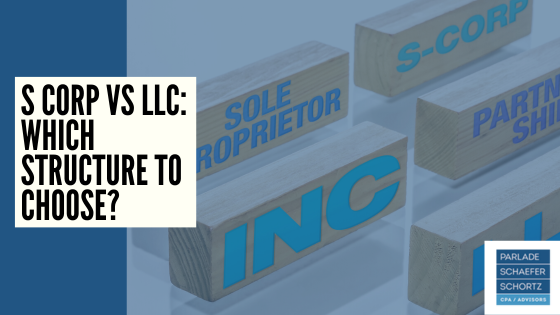
12 Dec, 2023
S Corporations, or S Corps, are popular among small businesses for their pass-through taxation structure. This means that profits and losses "pass through" the business to the individual shareholders, who report this income on their tax returns. Unlike C Corporations, S Corps does not pay federal income taxes at the corporate level. Both LLCs and S Corps pay estimated quarterly taxes. One of the challenges of this is the variability of income, which may make it challenging to predict quarterly tax payments accurately. Fluctuations in revenue, unexpected expenses, and changes in business circumstances can all impact the bottom line. To avoid this, reviewing financial statements and adjusting estimated payments as needed regularly is essential. Underestimating quarterly tax payments can result in penalties and interest charges from the IRS. Advantage of S Corp vs LLC: When choosing between an S Corporation (S Corp) and a Limited Liability Company (LLC), there are various factors to consider. One notable advantage of an S Corp compared to an LLC is the potential tax benefits. 1. Pass Through Taxation: One key advantage is its pass-through taxation. Like an LLC, an S Corp does not pay federal income taxes at the corporate level. Unlike an LLC, profits and losses pass through to the individual shareholders' tax returns. This can be beneficial because it avoids the double taxation associated with C Corporations, where the corporation is taxed on its income, and unlike LLCs the shareholders are taxed on their dividends. 2. Avoidance of Self-Employment Taxes: In an LLC, self-employment taxes are imposed on all business income. In contrast, S Corp owners can potentially reduce their self-employment tax burden. S Corp shareholders who work for the company can receive a reasonable salary, and the remaining profits may be distributed as dividends, which are not subject to self-employment taxes. 3. Flexibility in Distributing Income: S Corp owners can distribute income to shareholders through dividends and salary. While salary is subject to employment taxes, dividends are not. This flexibility allows business owners to optimize their compensation structure to minimize overall tax liability. It's important to note that while the tax advantages can be significant, specific rules and regulations govern the salary distributions to S Corp owners to prevent abuse and ensure that a reasonable salary is paid for services rendered. While the tax benefits are a notable advantage, other factors such as the complexity of compliance, governance structure, and the nature of the business should also be considered when choosing between an S Corp and an LLC. We are tax professionals and financial advisors in Florida who can help guide you through a business structure that meets your goals.

17 Nov, 2023
New retirement contribution limits for the 2024 tax year are out. The IRS has released the latest adjustment increases. These are the new contribution limits so you can plan accordingly for the upcoming year and make the most out of your retirement savings. Most limits were increased for the 2024 tax year to keep up with inflation. You can find the official IRS notice here or see the breakdown below. Employer-Sponsored Plans 401(k), 403(b), most 457 plans, and the federal Thrift Savings Plan have increased employee contribution limits by $500, raising the new contribution limit on employer-sponsored retirement plans to $23,000 annually. The amount individuals can contribute to their 401(k) plans has increased to $23,000, up from $22,500 for 2023. If you are 50 and older, the catch-up contribution limit for employees remains at $7,500 for 2024. The 401(k), 403(b), and 457 plans total contribution limits for 2024, including employer contributions, is $69,000, and an additional $7500 if you are over 50. IRA Contribution Limits Traditional IRAs and Roth IRAs have increased to $7000, up from $6500, with catch-up contributions for those 50 years or older able to contribute an additional $1000 per year. Deducting IRA Contributions If you have a work-sponsored retirement plan, you are subject to income thresholds to deduct IRA contributions. However, if you do not have a work retirement plan, these income thresholds do not apply. Traditional IRA phase‑outs Single or Head of Household phase-outs increased by $4000 from last year. Phase-out begins between $77,000 and $87,000, up from between $73,000 and $83,000. Married Filing Jointly If the person contributing to the IRA also has a workplace retirement plan, the phase-out begins at $123,000 and $143,000, up from between $116,000 and $136,000—a $7000 increase from the previous year. If you have an IRA and your spouse has a workplace retirement plan, phase-out is between $230,000 and $240,000. Married Filing Separately If you are married and filing separately with a workplace retirement plan, deductions are phased out between $0 and $10,000. Roth IRA phase-outs Limits to deducting Roth IRA contributions have been bumped up by a few thousand this year. Single or Head of Households Roth IRA contributions phase-out received an $8000 bump from the previous year, with phase-out beginning at $146,000 to $161,000. Married Filing Jointly The income phase-out limits increased by $12,000 for married couples filing jointly, and the phase-out range is now between $230,000 and $240,000. Married Filing Separately The phase-out range for a married individual filing a separate return who contributes to a Roth IRA is not subject to an annual cost-of-living adjustment and remains between $0 and $10,000. Additional contribution limit changes 2024 Health Savings Account Contribution Limits HSA has increased to $4150 for single people and $8300 for families. Those 55 years and older receive an additional $1000 catch-up. 2024 Flexible Spending Account Contribution Limits A typical FSA has increased by $150 to $3200. Plan for a Healthy Retirement If you’ve been saving for retirement but feel it might not be enough to sustain your desired lifestyle, then now is the time to reconsider your savings strategy with the new contribution limits in mind. Taking steps like maxing out contributions to the extent you can afford and reaping the benefits of compounding interest over time, you too can have a healthy nest egg for when those golden years arrive. Don’t forget you can create IRAs for your children too, creating further tax benefits and getting your kids off to a great start. We know tax and retirement planning can feel daunting, but with a knowledgeable financial advisor, a solid strategy can be made for you. If you need a Florida retirement planner and tax advisor specializing in the unique needs of doctors and health professionals in South Miami and Punta Gorda, FL, we are here to help; reach out with questions.

04 Oct, 2023
If you are a small business that has taken the arduous task of offering 401k benefits, you may be relieved by the 2023 changes. In 2023, the IRS introduced several changes to auditing requirements for small businesses with 401(k) plans. Small Business 401k Changes These adjustments are a welcome relief for many employers, given the financial burden annual audits can cause. While it's always advisable for businesses to perform audits to ensure compliance with ERISA regulations, it's worth noting that the government mandates audits of “ large plans ” to accompany the submission of Form 5500. This process is intricate, and hiring an audit consultant is necessary to guarantee compliance with the law if you are defined as a large plan . However, the alterations in 2023 redefine which businesses must undergo this potentially costly process. 401k Audit Requirements An annual 401(k) audit is recommended for all businesses to assess compliance and the retirement plan's overall health. However, it becomes a requirement for larger plans, and the definition of "large plans" has changed. You must conduct an audit if you initiate a plan with 100 or more participants. However, if you already had a plan last year, you can retain your small plan status if your participant count remains under 120. Furthermore, the method of counting participants has also evolved. Previously, all eligible employees and all terminated or retired employees with balances were included in the participant count. However, the changes in 2023 exclude eligible non-participating employees from the tally. This adjustment can be significant as it no longer artificially inflates your employee count with individuals who opt out of participating. 401K Audits Due These audits are due seven months after the end of your plan year. So, if you operate on a calendar year, this would be due on July 31. The Solo 401K For small businesses operating solo 401(k) plans—commonly used by self-employed individuals or partnerships—filing becomes mandatory once your plan's assets reach $250,000. Fortunately, for these types of 401(k)s, there is a streamlined process with the 5500 EZ form. Navigating the intricacies of 401(k) plans is challenging. As retirement plan regulations evolve, staying informed and compliant remains essential to manage these plans safely. To navigate these complexities, we are a team of CPA financial planners in South Miami and Punta Gorda, Florida, specializing in dentistry, medical, and real estate, among our many specialties. Give us a call to learn about our unique and comprehensive services.

04 Sep, 2023
Are you a dentist with dreams of diving into the world of real estate investment? Feel unsure of where to begin? Much like your dental education, your journey into real estate can benefit from structured learning and guidance. Real estate investing is vast, with numerous opportunities. Let's explore different types of real estate investments and guide you on where to find mentors and local experts in your area to maximize your success. Real estate investing offers a compelling route to early retirement for many professionals, including dentists. However, like any new venture, it comes with a learning curve. Consider finding a knowledgeable mentor and building connections within the industry. These steps will help you learn quickly and transition more smoothly into finding quality real estate investments. Is Becoming a Realtor a Wise First Step? One question often asked is whether becoming a real estate agent is a good starting point for aspiring investors. Becoming an agent will give you one aspect of handling real estate, but it also largely depends on the type of investor you want to be, passive or active? Are you interested in commercial or residential? Do you want to own rentals or flip houses? Depending on your answers, an agent may or may not be your best path forward. Find individuals that are most closely aligned with your goals to learn from. It is surprising how many people love to share their stories and pass on their knowledge if you simply invite them to a cup of coffee. Most areas have chapters of local real estate experts, compromising professionals from property managers, developers, commercial and residential investors, escrow officers, and real estate agents. It's a wealth of knowledge. These groups gather to share ideas, insights, and expertise, making them valuable resources for finding mentors and seeking answers to your investment questions relevant to the area you are in and the current economy. When it comes to real estate investment, there are diverse routes to consider, depending on your interests and goals. The key is to find your niche and follow your passion. You might aspire to be a partial investor in large commercial deals, own apartment complexes, or flip property. Each path has its unique appeal, and your enthusiasm will drive your success. Understanding Your Investment Options If the idea of property flipping properties appeals to you, consider building a network of essential team members, including contractors, inspectors, and lenders. These connections are foundational and necessary in order to become successful. Some dentists believe that becoming a real estate agent is a viable option. This route allows you to connect with professionals who can support your investment endeavors. However, it's essential to note that selling homes doesn't necessarily equate to successful investing. For those seeking a less hands-on role, passive real estate investments like Real Estate Investment Trusts (REITs), Delaware Statutory Trusts (DSTs) , or syndications might be more appealing. Finding your local real estate chapter is an excellent way to meet individuals engaged in these types of investments. It's crucial to choose an option that aligns with your interests and is enjoyable to learn about. If the subject doesn't captivate your interest, success may remain elusive, even if the potential returns are promising. Connecting with Local Experts and Mentors To locate local real estate groups, use social media platforms like Facebook. Join local real estate groups and inquire about meetups. If there aren't any scheduled, consider initiating one yourself. You'd be surprised at the positive response you may receive. The real estate profession, like dentistry, can sometimes feel isolating. Creating networking opportunities can be immensely rewarding, and you'll discover how many like-minded individuals are eager to connect. Having a seasoned mentor by your side can significantly accelerate your progress. With the right guidance and the power of networking, you'll be on your way to building a prosperous real estate portfolio that complements your dental career. Remember that being successful at real estate investing is not only about financial gains, but also enjoying the journey. We here at Parlade, Schaefer, and Schortz specialize in real estate, financial wealth planning, tax services and focus on meeting the unique needs of healthcare professionals; if you have any questions, please give us a call .
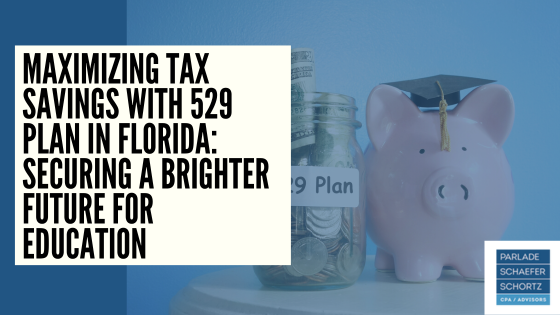
08 Aug, 2023
When it comes to saving for education expenses, Florida residents have a powerful tool at their disposal: the Florida 529 tax plan. Designed to encourage education savings while providing attractive tax benefits, a 529 plan offers Floridians an intelligent way to invest in their loved ones' futures while minimizing their tax burden. Let’s explore the tax-saving benefits of a 529 plan in Florida and provide practical guidance on how to make the most of this valuable resource. Understanding Florida's 529 Tax Plan Florida's 529 tax plan, known as the Florida Prepaid College Program, is a state-sponsored initiative that enables individuals to save for future education expenses. It offers two primary options: the Prepaid Plan and the Savings Plan. The Prepaid Plan allows participants to lock in today's tuition rates for future enrollment, shielding them from rising education costs. The Savings Plan, on the other hand, is an investment account providing tax advantages when the funds are used for qualified education expenses. Tax Benefits of a Florida 529 Plan One of Florida's 529 plan's most significant advantages is its tax benefits. Contributions to the plan are not deductible on federal taxes but may be deductible on Florida state income taxes, potentially lowering your overall tax liability. Furthermore, the earnings on your investments grow tax-free, meaning you won't have to pay taxes on the accrued interest or capital gains as long as the funds are used for qualified education expenses. A 529 plan helps you retain more of your wealth when used strategically. Qualified Education Expenses To fully leverage the tax-saving benefits of a 529 plan, it's crucial to understand what expenses are considered qualified. In Florida, qualified expenses include tuition, fees, required books, supplies, and equipment. Additionally, room and board expenses may be covered if the student is enrolled at least half-time. It is not just for college, either. The 529 funds can be used for lower grade levels and private schools. Understanding and documenting these eligible expenses is essential to ensure you can take full advantage of the tax benefits associated with your Florida 529 plan. How to Get Started Getting started with a Florida 529 plan is straightforward. It is free to open a plan and no minimum contribution limit. Evaluate the available options, and consider your financial goals, risk tolerance, and time commitment. Next, open a 529 plan account and start making contributions regularly. Many plans offer flexible contribution options, allowing you to contribute small amounts over time. Remember to stay informed about the plan's investment options and performance, adjusting your contributions and investment strategy to maximize your savings potential. Additional Considerations of 529 Plan While a 529 plan offers numerous tax benefits and savings opportunities, it's essential to be aware of its limitations. Non-qualified withdrawals could be subject to taxes and penalties, so ensure that funds are used for qualified expenses. Stay informed about any changes in the tax laws and consult with a financial advisor to make wise decisions that fit your unique circumstances. 529 plan Florida Florida's 529 tax plan provides residents an excellent opportunity to save for education while enjoying significant tax benefits. By understanding the tax-saving advantages, utilizing qualified education expenses, and staying informed about the plan's details, you can secure a brighter future for your loved ones while minimizing your tax burden. Start harnessing the power of a 529 plan today and invest in education with confidence. We can guide you through a 529 plan in Florida and much more to help you achieve your financial goals. We are financial planners and CPAs with offices in South Miami and Punta Gorda, providing personal and business financial planning to help you build and retain wealth. Reach out to gain more control over your wealth.

